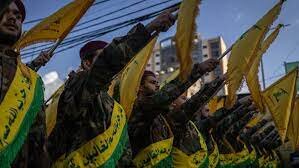Hezbollah paralyzes Israel's economy

BEIRUT - With great slowness and a clear failure to establish control, the Israeli invading army continues its attempt to invade two main axes: the Khiyam axis in the eastern sector and the Shama-Bayada axis in the western sector.
As part of the “Khaybar Operations” series, Hezbollah attacked several positions, including the Shraga base north of Acre, the Haifa naval base, the Hatzor air base (a major air wing containing squadrons of warplanes – 150 km from the border) east of Ashdod, etc.
In the course of operations, Hezbollah also killed Zeev Erlich, a Zionist archaeologist, on Wednesday. As a notorious settler, he had entered southern Lebanon with the military to “know the area” by examining an ancient fortress.
In the meantime, the Northern Command of the Israeli military prepared an indictment against the Chief of Staff of the Golani Brigade, Colonel Yoav Yarom, on charges of “negligence and carelessness with regard to the lives of soldiers,” noting that the Golani officers had accused their brigade commander, General Yair Pelay, of “mismanagement” that led to the death of more than 110 Zionist troops at the border with Lebanon.
Meanwhile, the Israeli Tax Authority estimates the direct and indirect damage in the occupied Palestinian territories on the Lebanese border at more than 5 billion shekels ($1.35 billion), stating that if a “settlement” with Lebanon is not reached, this value will double.
Yedioth Ahronoth revealed that the damage was to homes, apartments, factories, vehicles, agricultural land, infrastructure, public buildings, electricity and water networks, and more. The newspaper quoted the director of the Compensation Fund at the Tax Authority, Amir Dahan, as saying that two billion shekels were paid in compensation in the northern region.
According to Yedioth Ahronoth, the cost of the damage – direct and indirect – amounted to a quarter of a billion shekels in the occupied Golan Heights that was paid to those affected by the launching of missiles and drones from Lebanon, Syria and Iraq.
As for the south of the occupied territories, especially in the Gaza Envelope area, 1.25 billion shekels were paid in compensation to those affected.
In addition, significant damage was inflicted on property in the center of the occupied Palestinian territories, as one missile that fell in the city of Hod Hasharon caused damage to a large number of buildings. Also, another missile that fell in northern Tel Aviv (occupied Palestinian Jaffa) caused damage costing 50 million shekels.
According to Israeli experts, 50% of employees in the agricultural and tourism sectors in the occupied northern Palestinian territories are currently out of work.
The occupation regime’s Ministry of Industry has paid only 2 out of 5 billion shekels in unemployment compensation as the war has caused the closure of several factories near the border. International shipping companies have refrained from shipping through the airport and the port of Eilat, which has affected the production process.
Experts add that roughly 50% of the colonial settlers attend their work due to the sirens and the fall of shells, missiles and drones, in addition to the complete cessation of work in more than 27 settlements after Hezbollah ordered their evacuation weeks ago.
According to Zionist experts, Hezbollah’s bombing of security and military institutions such as Al-Bat, Rafael and Adasa led to the closure of many of them, forcing the military to evacuate barracks and transfer them to new secret centers in the middle of the occupied Palestinian territories. It happened after laying off about 200 out of 650 workers.
The real estate market has also recorded a significant decline, while it is expected to recover after a year and a half of the ceasefire, as about 12,000 families face a housing problem after their homes were destroyed or severely damaged.
In parallel, according to a preliminary assessment by the World Bank, more than 8.5 billion USD worth of damages has been inflicted on the Lebanese economy as a result of the US-led Israeli aggression. These estimates are not final due to the ongoing war.
Leave a Comment